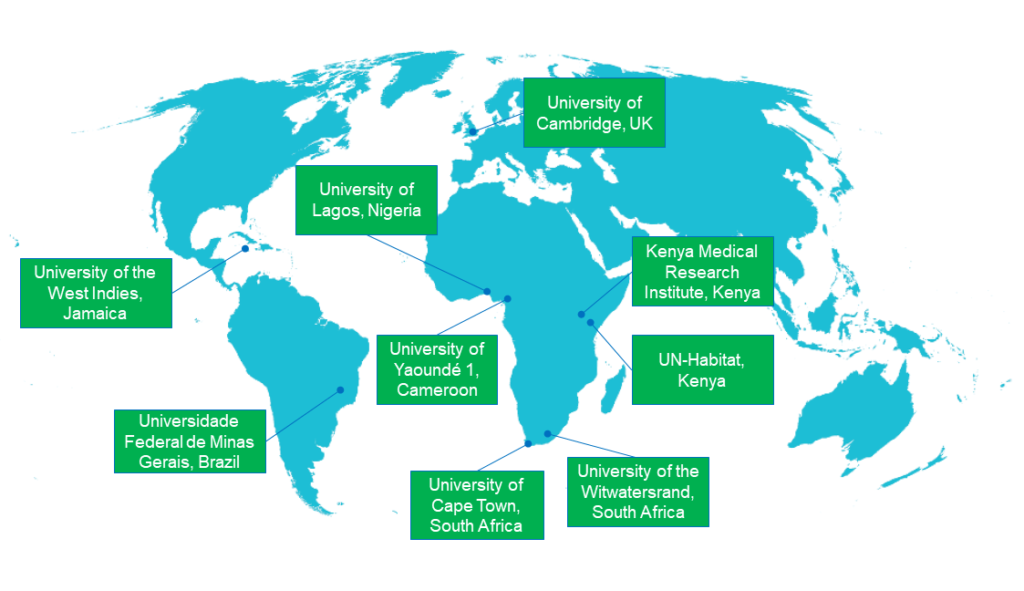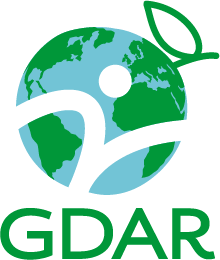We are a network of researchers from ten organisations in seven countries on three continents.
You can now explore our network’s members, news, publications, outputs and impacts with our interactive map.

On this page are the institutions, Principal Investigators and core staff for the GDAR Spaces research, starting in 2021. A list of researchers and staff engaged with the first period of GDAR research, 2017-2021 can be found here.
Jump to:
Brazil
Observatory for Urban Health in Belo Horizonte (OSUBH), Universidade Federal de Minas Gerais, Belo Horizonte
Show more
- Waleska Caiaffa. Principal Investigator, Director of OSUBH
- Elis Borde. Co-Principal Investigator, Associate Professor
- Lidia Maria de Oliveira Morais. Project Coordinator, PhD student. LinkedIn profile
- Larissa Lima. Researcher
- Adalberto A. S. Lopes. Researcher. LinkedIn profile
- Amanda Magalhães. Researcher, PhD student
Cameroon
Health of Populations in Transition Research Group (HoPiT), University of Yaoundé 1, Yaoundé
Show more
- Jean Claude Mbanya. Principle Investigator, Director of HoPiT. Professor of Medicine and Endocrinology, Consultant Physician, Director of the National Obesity Centre, Chief of the Endocrinology and Metabolic Diseases Unit.
- Felix Assah. Co-Investigator, Deputy Director of HoPiT, Senior Lecturer of Epidemiology and Public Health
- Edwin Ngwa. Project Coordinator.
- Clarisse Mapa Tassou. Researcher, Lecturer in Public Health.
- Lambed Tatah. Researcher, Public Health Physician, Epidemiologist.
- Tchouaffi Awah Kum. Researcher, Medical Anthropologist.
- Yves Wasnyo. Researcher, Physician, PhD candidate.
- Nfondoh Blanche. Researcher, PhD candidate.
- Boris Elouna. Research Assistant.
Jamaica
Caribbean Institute for Health Research (CAIHR), University of the West Indies (UWI), Kingston
Show more
- T. Alafia Samuels. Director, Professor, Previous Director of the George Alleyne Chronic Disease Research Centre.
- Marshall Tulloch-Reid. Principle Investigator, Professor of Epidemiology and Endocrinology, Director of CAIHR, Co-Director of the Caribbean Branch of the US Cochrane Centre.
- Georgiana Gordon-Strachan. Co-Investigator, Director of the Tropical Metabolism Research Unit.
- Janel Phillips. Project Coordinator.
- Joanne Smith. Researcher, Lecturer.
- Trevor Ferguson. Researcher, Director of the Epidemiology Research Unit.
- Natalie Guthrie-Dixon. Researcher, Biostatistician.
- Tonya Campbell. Researcher, PhD candidate.
- Suzanne Soares-Wynter. Researcher, Clinical Nutritionist.
Former Collaborators
- Rupert Green. Project Coordinator.
- Ishtar Govia. Researcher, Senior Lecturer.
- Ian Hambleton. Researcher, Professor of Biostatistics.
Kenya
Centre for Global Health Research, Kenya Medical Research Institute (KEMRI), Kisumu
Show more
- Charles Obonyo. Principle Investigator, Chief Research Officer, Epidemiologist.
- Vincent Were. Co-Principle Investigator, Associate Research Scientist at African Population and Health Research Centre (APHRC).
- Charles Lwanga. Project Coordinator, Research Manager at Adaptive Management & Research Consultants (AMREC AFRICA).
- Gladys Odhiambo. Research Assistant, Study Coordinator at Urban CDI.
Former Collaborators
- Rosemary Musuva. Researcher.
- Pamela Wadende. Researcher, Developmental Psychologist and Senior Lecturer, Kisii University.
Nigeria
Centre for Housing and Sustainable Development, University of Lagos, Lagos
Show more
- Taibat Lawanson. Principal Investigator, Professor of Urban Management and Governance, Co-director of the Centre for Housing and Sustainable Development.
- Victor Onifade. Co-Principal Investigator, Senior Lecturer of Urban Planning, Cluster Manager of Sustainable Cities and African Urbanization Dynamics.
- Damilola Odekunle. Project Coordinator, Registered Urban Planner, Lecturer.
- Olabode Orelaja. Researcher, Senior Lecturer.
- Vide Adedayo. Researcher, Associate Professor.
- Opeyemi Babajide. Researcher.
South Africa
Faculty of Health Sciences, University of Cape Town, Cape Town
Show more
- Estelle (Vicki) Lambert. Principle Investigator, Emeritus Professor at Research Centre for Health through Physical Activity, Lifestyle and Sport (HPALS).
- Maylene Shung King. Principle Investigator, Associate Professor at the Health Policy and Systems Division.
- Feyisayo Wayas. Co-Principal Investigator and Co-Training Lead, Senior Researcher at Research Centre for Health through Physical Activity, Lifestyle and Sport (HPALS).
- Zulfah Albertyn-Blanchard. Researcher, Research Fellow at the Research Centre for Health through Physical Activity, Lifestyle and Sport (HPALS).
- Olufunke Alaba. Researcher, Deputy Director and Senior Lecturer at the Health Economics Unit.
SAMRC / Wits Developmental Pathways for Health Research Unit (DPHRU), University of the Witwatersrand, Johannesburg
Show more
- Lisa Micklesfield. Principal Investigator, Research Professor and Deputy Director of DPHRU.
- Khulu Gama. Researcher.
Former Collaborators
- Vongani Maluleke. Researcher, PhD candidate.
- Motlatso Godongwana. Co-Principal Investigator.
SAMRC / Wits Centre for Health Economics and Decision Science (PRICELESS SA), University of Witwatersrand, Johannesburg
Show more
- Karen Hofman. Principal Investigator, Research Professor and Founding Director of PRICELESS SA.
- Susan Goldstein. Interim Principal Investigator, Public Health Medicine Specialist and Managing Director of PRICELESS SA.
- Elizabeth Thomas. Co-Principal Investigator and Project Coordinator.
- Yolanda Radu. Researcher.
- Darshen Naidoo. Researcher.
- Bontle Mamabolo. Research Assistant.
Former Collaborators
- Mikateko Mafuyeka. Co-Principal Investigator and Project Coordinator, Public Health Lawyer.
- Petronell Kruger. Researcher, Public Health Lawyer.
- Teurai Rwafa. Researcher.
- Lee Randall. Researcher, Occupational Therapist, Co-Founder of the Road Ethics Project.
UK
MRC Epidemiology Unit, University of Cambridge, Cambridge
Show more
- Tolullah Oni. Director and Co-Training Lead, Clinical Professor, Public Health Physician Scientist and Urban Epidemiologist.
- Lou Foley. Director and Co-Training Lead.
- Meelan Thondoo. Researcher.
- Tiago Canelas. Researcher.
- Nina Abrahams. Researcher.
- Trish Muzenda. Researcher, PhD candidate.
- Gabriel Okello. Researcher, Prince of Wales Research Fellow, Founder of African Centre for Clean Air.
- Jose Izcue Gana. Researcher, PhD candidate.
- Gospel Ikpotokin-Ab. Researcher, Master candidate.
- Fiona Whittle. Project Coordinator.
- Malaika Hirani. Project Coordinator.
- Oliver Francis. Communications.
- Pamela Mungroo. Communications.
Former Collaborators
- Mayami Abdulla. Project Coordinator.
- Kenneth Anujuo. Project Coordinator, Public Health Epidemiologist.
- Pamela Carbajal Perez. Project Coordinator.
- Muhammad Rabiu Balarabe. Researcher, Master candidate.
- Natasha O’Sullivan. Visiting Researcher, Physician, Academic Clinical Fellow.
- Florence Nabwire. Visiting Researcher, Prince of Wales Fellow.
- Erin Mathieu. Visiting Researcher, Lecturer in Epidemiology.
- Anna Brugulat Panés. Researcher, PhD candidate.
- Ozioma Oguejiofor. Researcher, Master candidate.
- Alaya Adogoboba. Project Coordinator.
UN-Habitat
UN-Habitat Secretariat, Nairobi
Show more
- Remy Sietchiping. Principal Investigator, Chief of Policy, Legislation and Governance Section.
- Grace Githiri. Co-Principal Investigator, Associate Programme Management Officer.
